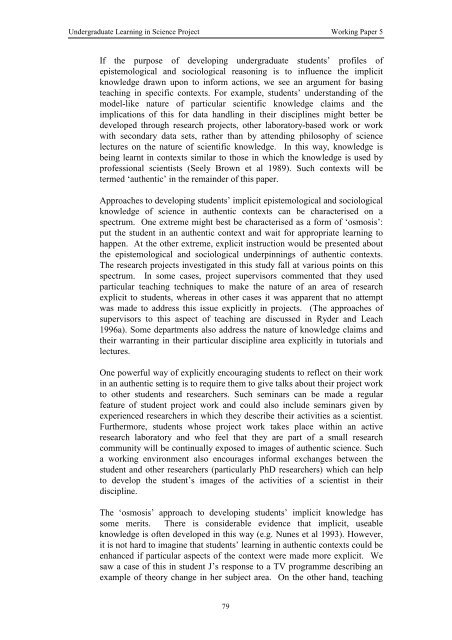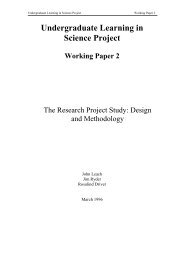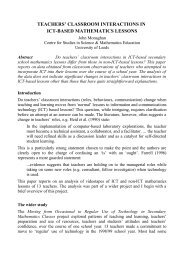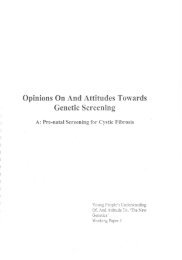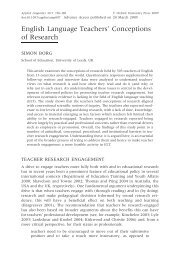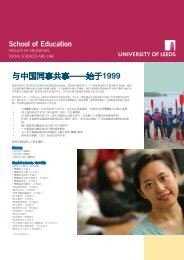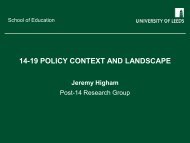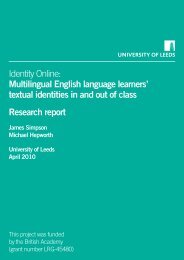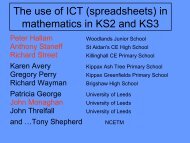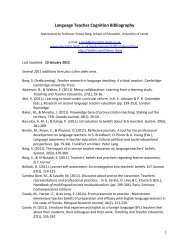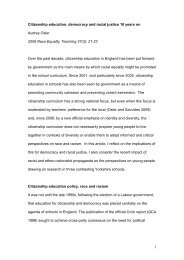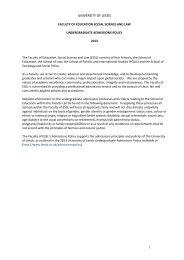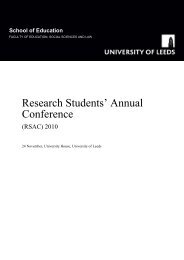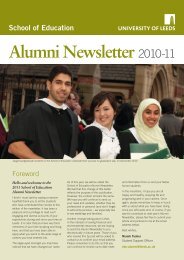Undergraduate science research projects and students - School of ...
Undergraduate science research projects and students - School of ...
Undergraduate science research projects and students - School of ...
Create successful ePaper yourself
Turn your PDF publications into a flip-book with our unique Google optimized e-Paper software.
<strong>Undergraduate</strong> Learning in Science Project Working Paper 5If the purpose <strong>of</strong> developing undergraduate <strong>students</strong>’ pr<strong>of</strong>iles <strong>of</strong>epistemological <strong>and</strong> sociological reasoning is to influence the implicitknowledge drawn upon to inform actions, we see an argument for basingteaching in specific contexts. For example, <strong>students</strong>’ underst<strong>and</strong>ing <strong>of</strong> themodel-like nature <strong>of</strong> particular scientific knowledge claims <strong>and</strong> theimplications <strong>of</strong> this for data h<strong>and</strong>ling in their disciplines might better bedeveloped through <strong>research</strong> <strong>projects</strong>, other laboratory-based work or workwith secondary data sets, rather than by attending philosophy <strong>of</strong> <strong>science</strong>lectures on the nature <strong>of</strong> scientific knowledge. In this way, knowledge isbeing learnt in contexts similar to those in which the knowledge is used bypr<strong>of</strong>essional scientists (Seely Brown et al 1989). Such contexts will betermed ‘authentic’ in the remainder <strong>of</strong> this paper.Approaches to developing <strong>students</strong>’ implicit epistemological <strong>and</strong> sociologicalknowledge <strong>of</strong> <strong>science</strong> in authentic contexts can be characterised on aspectrum. One extreme might best be characterised as a form <strong>of</strong> ‘osmosis’:put the student in an authentic context <strong>and</strong> wait for appropriate learning tohappen. At the other extreme, explicit instruction would be presented aboutthe epistemological <strong>and</strong> sociological underpinnings <strong>of</strong> authentic contexts.The <strong>research</strong> <strong>projects</strong> investigated in this study fall at various points on thisspectrum. In some cases, project supervisors commented that they usedparticular teaching techniques to make the nature <strong>of</strong> an area <strong>of</strong> <strong>research</strong>explicit to <strong>students</strong>, whereas in other cases it was apparent that no attemptwas made to address this issue explicitly in <strong>projects</strong>. (The approaches <strong>of</strong>supervisors to this aspect <strong>of</strong> teaching are discussed in Ryder <strong>and</strong> Leach1996a). Some departments also address the nature <strong>of</strong> knowledge claims <strong>and</strong>their warranting in their particular discipline area explicitly in tutorials <strong>and</strong>lectures.One powerful way <strong>of</strong> explicitly encouraging <strong>students</strong> to reflect on their workin an authentic setting is to require them to give talks about their project workto other <strong>students</strong> <strong>and</strong> <strong>research</strong>ers. Such seminars can be made a regularfeature <strong>of</strong> student project work <strong>and</strong> could also include seminars given byexperienced <strong>research</strong>ers in which they describe their activities as a scientist.Furthermore, <strong>students</strong> whose project work takes place within an active<strong>research</strong> laboratory <strong>and</strong> who feel that they are part <strong>of</strong> a small <strong>research</strong>community will be continually exposed to images <strong>of</strong> authentic <strong>science</strong>. Sucha working environment also encourages informal exchanges between thestudent <strong>and</strong> other <strong>research</strong>ers (particularly PhD <strong>research</strong>ers) which can helpto develop the student’s images <strong>of</strong> the activities <strong>of</strong> a scientist in theirdiscipline.The ‘osmosis’ approach to developing <strong>students</strong>’ implicit knowledge hassome merits. There is considerable evidence that implicit, useableknowledge is <strong>of</strong>ten developed in this way (e.g. Nunes et al 1993). However,it is not hard to imagine that <strong>students</strong>’ learning in authentic contexts could beenhanced if particular aspects <strong>of</strong> the context were made more explicit. Wesaw a case <strong>of</strong> this in student J’s response to a TV programme describing anexample <strong>of</strong> theory change in her subject area. On the other h<strong>and</strong>, teaching79


